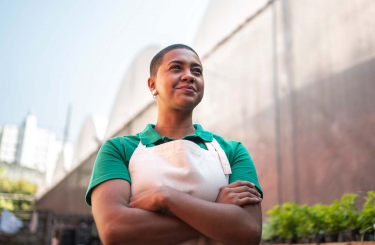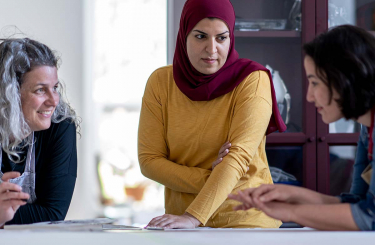

The information shared by our members helps to provide an updated picture of London’s funding environment and priorities. We’re pleased to share some of our key findings below, and you can read more about what funding in London looks like here.
Who are our members?
Completed by 47% (82) of our members, the survey was largely representative of our cross-sector membership, demonstrating the diversity of our network and the different ways London’s civil society is supported.
You can meet the members of the ever-growing London Funders movement here.
Where do our members fund?
44% of respondents stated that they funded/supported ‘all London boroughs’. This is an increase from our previous Audit which found that only 37% funded all boroughs.
Funders are also keen to increase their grant-making in some of London’s ‘cold spots’, suggesting there is a desire to be proactive in investing in these areas.
How much do our members invest in London’s civil society?
Based on respondents’ answers, combined, our members gave out over £704m in grants across London in their last financial year.
Nearly half (48%) of respondents are giving out more funds than in previous years. Some of this is reflective of the pandemic and the cost of living crisis.
How do our members fund?
Restricted project grants are the most common type of funding distributed among respondents
However, 33% said they offered four or more different types of funding.
Our Audit also found that 60% of respondents offer single grants of over £50k and of these funders, 56% are providing funding for 3-5+ years.
The majority (55%) of respondents use panel discussions with staff and trustees to support decision-making, followed by panel discussions with staff only (40%). 39% use internal and external partners and 20% use community/ local residents panels.
How do our members engage with initiatives to make funding more equitable, transparent and accessible?
- 66% are aware of the DEI data standard, with 17% already piloting it and 23% planning to use it in the future
- 48% publish their grants data on 360Giving (this is up from 45% at the last audit)
- 41% said they were part of IVAR’s open and flexible grant-making commitments. Of the 59% who were not, 21% said they planned to or were in the process of signing up
- 83% said they collaborate with other funders (last year’s audit showed 71% were ‘always interested in collaborating with other funders)
48% of respondents said they are taking steps to embed action against climate change in their grant-making and how they work, while 76% said they are taking steps to advance equity - for practical examples of how members are advancing equity and taking climate action, you can check out our full findings here.
Funding focuses and future priorities
Whilst diverse in their nature, there were commonalities among survey respondents in terms of their current funding themes and future priorities.
Based on respondents’ answers, the most commonly funded areas are:
- Children and young people (77%)
- Education, employment and training (63%)
- Poverty (62%)
- Community resilience, integration and cohesion (54%)
- Advice (46%)
We also asked members to share their priorities for the next 12 months, specifically regarding Londoners and the challenges they face. Many respondents said they are continuing to prioritise the cost of living crisis and the lasting impacts of the pandemic. A commitment to equity across all themes was another shared priority.
Relating to their approach to grant making, a number of members said they are undergoing strategic and governance reviews in line with principles of DEI and sustainability. Besides this, other key priorities include:
- A commitment to systemic change
- A commitment to equitable, flexible and long-term funding principles rooted in participation
- A continued desire to share intelligence
Relating to specific funding themes, some of the areas which members said they were planning to focus on included:
- Place-based funding and capacity building smaller organisations:
- Poverty, homelessness, and community resilience
- Children and young people’s health, wellbeing, skills and training
- Women and Girls: economic justice and violence prevention
- Health Inequalities and service provision
Other funding priorities included supporting initiatives focused on bettering the quality of life and social engagement of migrants, refugees, asylum seekers and elderly people.
We want to extend a huge thank you to all the members who shared their views and data in this year’s audit. The information is critical in providing a baseline of funding in London and helps us to understand the practice and priorities of London’s funding community. From this year’s findings, it is encouraging that so many members are keen to collaborate with others so we can create a greater impact for London’s civil society. We will be using the results to inform our ongoing learning and events programme, as well as opportunities to convene members around the issues you identified as important to your work so that we can all build a safer, greener and more equitable London.
We’re keen to hear more from members about your current priorities and any ideas you might want to share so do book a meeting with our Membership Manager, Nasyah here.


